Truthdigger of the Week: Zianna Oliphant, Fearless Fourth-Grader Who Spoke on Racial Injustice
Oliphant pleaded for the right to protest and argued for change in the treatment of the black community in the wake of the fatal police shooting of an African-American man in Charlotte, N.C.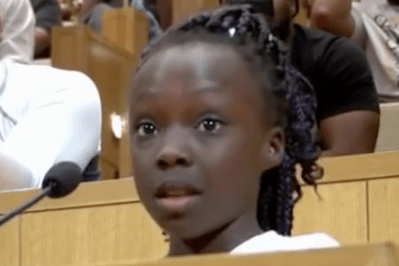
Zianna Oliphant speaks to the Charlotte City Council. (ignoredvoices / YouTube)
Every week the Truthdig editorial staff selects a Truthdigger of the Week, a group or person worthy of recognition for speaking truth to power, breaking the story or blowing the whistle. It is not a lifetime achievement award. Rather, we’re looking for newsmakers whose actions in a given week are worth celebrating.
It takes a certain type of bravery to stand up in front of a crowd and speak on racial inequality, one of the most complex and divisive issues the nation currently faces. This bravery was recently amplified in the words of Zianna Oliphant, a 9-year-old girl born and raised in Charlotte, N.C.
On Monday night, Charlotte’s City Council held its first meeting since the fatal police shooting of Keith Lamont Scott. His death has prompted nationwide outrage and spurred passionate protests—one of which led to the death of a civilian—throughout the city. Last weekend, the Charlotte-Mecklenburg Police Department released body- and dashboard-camera video of the incident; many activists have argued that the two minutes of footage does not accurately show what happened.
And so, on Monday night, demonstrators and activists from around the state arrived at the City Council meeting seeking answers. Charlotte Mayor Jennifer Roberts allotted two hours for public speeches, and it was during this time that Oliphant took the podium.
.mcclatchy-embed{position:relative;padding:40px 0 56.25%;height:0;overflow:hidden;max-width:100%}.mcclatchy-embed iframe{position:absolute;top:0;left:0;width:100%;height:100%}
“I come here today to talk about how I feel. And I feel like—that we are treated differently than other people,” she began. “I don’t like how we’re treated. Just because of our color—it doesn’t mean anything to me. I believe that—”
Overwhelmed with emotion, she stopped. “You’re doing great,” someone in the crowd said. “Do not stop!” yelled someone else.
“We are black people and we shouldn’t have to feel like this,” she resumed, holding back tears. “We shouldn’t have to protest because y’all are treating us wrong. We do this because we need to. And have rights.”
She paused again, looking down at the podium, and the crowd began to clap. Oliphant, encouraged, continued:
I [was] born and raised in Charlotte. And I never felt this way till now. And I can’t stand how we’re treated. It’s a shame that our fathers and mothers are killed and we can’t even see them anymore. It’s a shame that we have to go to their graveyard and bury them. And we have tears. And we shouldn’t have tears. We need our fathers and mothers to be by our side.
As she slipped away from the podium, the audience got to its feet. “No justice, no peace!” was the call and response.
Footage of Oliphant’s tearful plea to Charlotte’s City Council went viral, prompting viewers around the nation to applaud the girl, who is still in elementary school.
Colin Kaepernick, the football player who has become infamous for his refusal to stand for the national anthem, called the video of Oliphant’s speech “painful” to watch. Journalist Shaun King said the video “ripped my heart out.”
As protests in reaction to a recent, highly publicized spate of police shootings of African-Americans gain momentum, it’s important to note that it’s not just adults taking action. For example, 11- and 12-year-old African-American players on a middle-school football team in rural Texas have begun kneeling during the national anthem—and have continued to do so in the face of death threats and their coach’s suspension. And in another part of Texas, an 8-year-old African-American boy was sent home from school because he refused to stand for the Pledge of Allegiance.
Oliphant’s heartfelt plea is a reminder of how the racial biases that often contribute to police violence are instilled at an early age. NPR reported Wednesday on research from the Yale Child Study Center. Researchers found that even preschool teachers harbor implicit bias, “subtle, often subconscious stereotypes that guide our expectations and interactions with people.” The study concluded that “[t]eachers looked more at the black children than the white children, and they looked specifically more at the African-American boy.”
And while Oliphant expressed her feelings about what it must feel like to have a parent die—Lamont Scott and Terence Crutcher, who was shot earlier in September in Tulsa, Okla., were both fathers—implicit biases in society have also contributed to the deaths of children. Racially charged violence toward children, seen, for example, in the murder of Emmett Till more than five decades ago, is still present in society today. Take the tragic death of Tamir Rice in 2014; the officer who fatally shot the 12-year-old boy believed that he was 18.As NPR reported, these implicit biases often affect African-American males more strongly. A 2014 study published by the American Psychological Association found that police are “likelier to use force against black children” because African-American boys as young as 10 are “more likely to be mistaken as older, be perceived as guilty and face police violence if accused of a crime.”
For many African-American families, these studies are a terrifying aspect of raising children. “I shouldn’t have to enlighten my kids on discrimination and racism,” Oliphant’s mom told NBC News.
The television show “Blackish” recently made headlines for addressing this issue. Although a comedic show, it was praised for adopting a serious tone in a scene in which the onscreen parents attempt to discuss police brutality with their children.
Oliphant’s powerful remarks emerged unexpectedly. Her mom notes that she hadn’t planned to speak. “I was a little nervous, so I decided to just go up there and tell them how I feel,” Oliphant told NBC News. “I was just feeling like what the police are doing to us, just because of our skin, is not right.”
While Oliphant’s plea focuses on the tragic, often violent treatment of African-Americans throughout this country, her mom explains that her children are developing more positive relationships with police. According to NBC News, Oliphant and her brother are enrolled in a police youth league.
Programs aimed at teaching social justice methods have begun to spring up around the country. And, as San Francisco Pastor Bruce Reyes-Chow noted in 2014, it’s crucial to teach children of all ethnicities about racial inequality. “[B]y choosing not to raise these issues, we perpetuate a culture of anti-blackness and non-black privilege that have been the foundation for what is taking place in Ferguson,” he writes.
Now, more than two years since the death of Michael Brown in Ferguson, Mo., it seems that teachers are starting to get the message, and many Americans are getting more comfortable talking about the often-uncomfortable subject of racial inequality.
Oliphant knows it can be difficult for kids to take a stand on these emotional issues. “Kids, they’re, like, shy,” she told NBC News. “But I’m not shy to tell them how I feel about it.”
For fearlessly taking a stand and addressing the hard truths of racial inequality and police violence, Zianna Oliphant is our Truthdigger of the Week.
Independent journalism is under threat and overshadowed by heavily funded mainstream media.
You can help level the playing field. Become a member.
Your tax-deductible contribution keeps us digging beneath the headlines to give you thought-provoking, investigative reporting and analysis that unearths what's really happening- without compromise.
Give today to support our courageous, independent journalists.
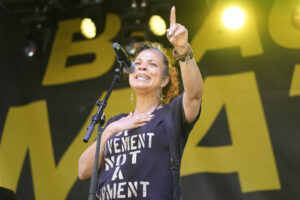
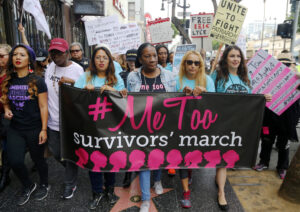
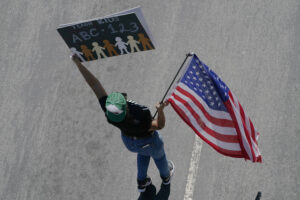
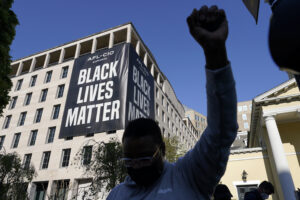
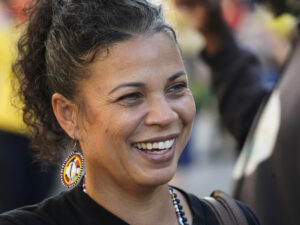
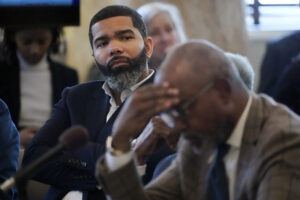
You need to be a supporter to comment.
There are currently no responses to this article.
Be the first to respond.